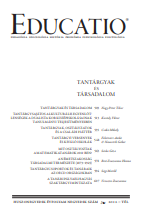Tantárgy-sajátos alkulturális egyenlőtlenségek a dualista kor középiskolásainak tanulmányi teljesítményeiben
Subject Specific Sub-Cultural Performance Differentials Among Students of Graduating Classes in Hungarian Secondary Schools of the Dual Monarchy
Author(s): Viktor KarádySubject(s): Education, Recent History (1900 till today), Theology and Religion, School education, Higher Education , History of Education, Evaluation research, 19th Century, Sociology of Education
Published by: Akadémiai Kiadó
Keywords: education; subject; age; learning outcomes; secondary school; Dual Monarchy; sub-cultural performance;
Summary/Abstract: This is an empirical study of performance differentials had by graduating students in five major secondary education subjects: Hungarian language and literature, German, Latin, Maths and Physical Education. Performance is measured by average marks (on a 4-grade scale, when 1 = best an 4 = failure). The study is based on a unique overall survey of secondary school students in the time period 1850-1950. Only global results from the survey are analyzed here, in line with a combination of two variables: religion and ethnic background (indicated by the the surnames of pupils involved). The main results of the study can be seen and summarized in a clear hierarchy of academic achievement in intellectual subjects – with Jews at the top, being closely followed by Lutherans as well as (at a distance) Roman Catholics and Calvinists; while members of the Greek Orthodox and Uniate (Greco-Catholic) faith came last. In every subject, pupils with a German background tended to perform better than others (except for Jews, where the best achievers were the most ‚assimilated’, i.e. those with Magyarized names). Explanations for these rather marked differences come via ethnic minorities having a need to compensate for social handicaps, their value systems and inherited ‚cultural capital’ - especially their sub-culturally and in-bred relationship to schooling (learning habits); also, their respective strategies of educational mobility as well as the internal selection process they have gone through during their educational trajectory
Journal: Educatio
- Issue Year: 21/2012
- Issue No: 4
- Page Range: 513-534
- Page Count: 22
- Language: Hungarian

